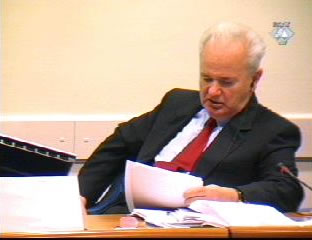Home
MILOSEVIC DAMAGING HIS OWN INTERESTS?
The hesitation of Milosevic's potential witnesses to appear before the Tribunal and the refusal of the accused to contact his appointed counsel and to get involved in the presentation of evidence have not, at least not yet, shaken the Trial Chamber's commitment to maintain the set course in order to keep the trial under control and to end it in reasonable time
 Slobodan Miloševic during the cross examination
Slobodan Miloševic during the cross examination As the hearing yesterday drew to a close, Slobodan Milosevic noted that the counsel appointed to him – Steven Kay and Gillian Higgins – "took three days to examine two witnesses", and that there are over 1,600 witnesses on his list. In his opinion, this indicates their intent to "water down and cripple his defense."
Rejecting such claims, Kay replied that he had contacted all three witnesses that Milosevic and his associates had planned to examine last week; two of them have indeed been examined (Avramov and Jatras), while the third "did not want to come before talking to Milosevic", which he actually had done in the meantime, as far as Kay knew.
When Judge Bonomy noted that this "contradicts what the accused is saying," Kay replied that that was why he said it, since he was blamed for the failure of the witnesses to appear.
Noting that the witnesses called for last week "covered the available time" and that he would continue to call them according to the list submitted by Milosevic, Kay expressed a "certain concern" caused by public statements made by some of the potential witnesses, such as the last Soviet Prime Minister, Nikolay Ryzhkov. They have been saying they would not come to The Hague since the appointed counsel, according to the order of the Chamber, "have the right to prepare and call witnesses they see fit."
In order to remove any doubts, Kay specified that he saw "fit" to call all the witnesses from Milosevic's list and that he was urging them all to come to The Hague because it was primarily in the interest of the accused himself.
The judges joined in, appealing to all the witnesses on the list submitted by the accused to "place themselves at he disposal of the defense counsel and the Chamber", in the interest of Milosevic. If the defense is unable to present all its evidence, the responsibility will, as Presiding Judge Robinson stressed, "fall on the accused."
Until now, no one has, at least not publicly, accused Milosevic or his associates of trying to influence potential witnesses, dissuading them from coming to The Hague and thus damaging their own interests; or, as the accused would say, "watering down and crippling" his own defense.
The hesitation of Milosevic's potential witnesses to appear before the Tribunal and the refusal of the accused to contact his appointed counsel and to get involved in the presentation of evidence have not, at least not yet, shaken the Trial Chamber's commitment to maintain the same course in order to keep the trial under control and to end it in reasonable time. At the end of the last hearing this week, the judges called on Milosevic to "think again" until Tuesday (when he is to return to the courtroom) about the proposals of the Chamber to determine an "acceptable mechanism for his participation in the proceedings to the extent warranted by his health."
If Milosevic fails to do so, Judge Robinson was quite specific, the Chamber will proceed with the trial in the same manner as it did last week.
Linked Reports
- Case : Milosevic Slobodan - "Kosovo, Croatia and Bosnia"
- 2004-09-09 PROSECUTOR TRIES TO IMPEACH MILOSEVIC WITNESS
- 2004-09-08 KAY TO APPEAL THE APPOINTMENT OF COUNSEL INSTEAD OF MILOSEVIC
- 2004-09-08 EXERCISES IN FUTILITY
- 2004-09-14 HEARING ON THE MOTION TO SUSPEND MILOSEVIC TRIAL TO BE HELD TOMORROW
- 2004-09-14 VERIFIER VS. VERIFIER
- 2004-09-15 MILOSEVIC TRIAL ADJOURNED UNTIL 12 OCTOBER
